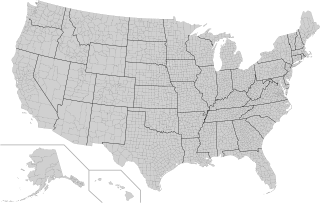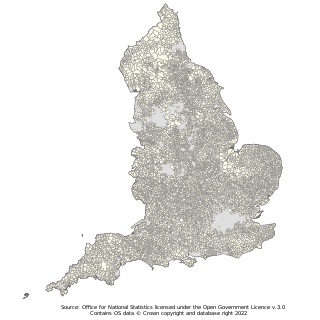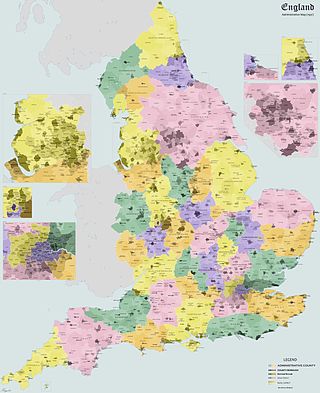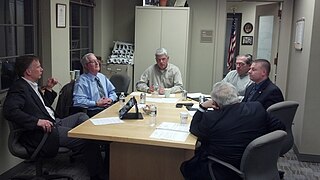Related Research Articles
A unitary authority is a local authority responsible for all local government functions within its area or performing additional functions that elsewhere are usually performed by a higher level of sub-national government or the national government.

In the United States, a county or county equivalent is an administrative or political subdivision of a state which consists of a geographic region with specific boundaries and usually some level of governmental authority. The term "county" is used in 48 states, while Louisiana and Alaska have functionally equivalent subdivisions called parishes and boroughs, respectively. The specific governmental powers of counties vary widely between the states, with many providing some level of services to civil townships, municipalities, and unincorporated areas. Certain municipalities are in multiple counties; New York City is uniquely partitioned into five counties, referred to at the city government level as boroughs. Some municipalities have been consolidated with their county government to form consolidated city-counties, or have been legally separated from counties altogether to form independent cities. Conversely, those counties in Connecticut, Rhode Island, eight of Massachusetts's 14 counties, and Alaska's Unorganized Borough have no government power, existing only as geographic distinctions.
In many countries, a mayor is the highest-ranking official in a municipal government such as that of a city or a town. Worldwide, there is a wide variance in local laws and customs regarding the powers and responsibilities of a mayor as well as the means by which a mayor is elected or otherwise mandated. Depending on the system chosen, a mayor may be the chief executive officer of the municipal government, may simply chair a multi-member governing body with little or no independent power, or may play a solely ceremonial role. A mayor's duties and responsibilities may be to appoint and oversee municipal managers and employees, provide basic governmental services to constituents, and execute the laws and ordinances passed by a municipal governing body. Options for selection of a mayor include direct election by the public, or selection by an elected governing council or board.
A city manager is an official appointed as the administrative manager of a city, in a "Mayor–council government" council–manager form of city government. Local officials serving in this position are sometimes referred to as the chief executive officer (CEO) or chief administrative officer (CAO) in some municipalities.

A parish council is a civil local authority found in England, which is the lowest tier of local government. They are elected corporate bodies, with variable tax raising powers, and they carry out beneficial public activities in geographical areas known as civil parishes. There are about 10,480 parish and town councils in England. Parish councils may be known by different styles, they may resolve to call themselves a town council, village council, community council, neighbourhood council, or if the parish has city status, it may call itself a city council. However their powers and duties are the same whatever name they carry.

In England, a civil parish is a type of administrative parish used for local government. It is a territorial designation which is the lowest tier of local government. Civil parishes can trace their origin to the ancient system of parishes, which for centuries were the principal unit of secular and religious administration in most of England and Wales. Civil and religious parishes were formally split into two types in the 19th century and are now entirely separate. Civil parishes in their modern form came into being through the Local Government Act 1894, which established elected parish councils to take on the secular functions of the parish vestry.
A town council, city council or municipal council is a form of local government for small municipalities.

A municipal borough was a type of local government district which existed in England and Wales between 1836 and 1974, in Northern Ireland from 1840 to 1973 and in the Republic of Ireland from 1840 to 2002. Broadly similar structures existed in Scotland from 1833 to 1975 with the reform of royal burghs and creation of police burghs.

The select board or board of selectmen is commonly the executive arm of the government of New England towns in the United States. The board typically consists of three or five members, with or without staggered terms. Three is the most common number, historically.

Most U.S. states and territories have at least two tiers of local government: counties and municipalities. Louisiana uses the term parish and Alaska uses the term borough for what the U.S. Census Bureau terms county equivalents in those states. Civil townships or towns are used as subdivisions of a county in 20 states, mostly in the Northeast and Midwest.

The Representation of the People Act 1948 was an Act of the Parliament of the United Kingdom that altered the law relating to parliamentary and local elections. It is noteworthy for abolishing plural voting for parliamentary elections, including by the abolition of the twelve separate university constituencies; and for again increasing the number of members overall, in this case to 613.
The Optional Municipal Charter Law or Faulkner Act provides New Jersey municipalities with a variety of models of local government. This legislation is called the Faulkner Act in honor of the late Bayard H. Faulkner, former mayor of Montclair, New Jersey and chairman of the Commission on Municipal Government.

Leicester City Council is a unitary authority responsible for local government in the city of Leicester, England. It consists of 54 councillors, representing 22 wards in the city, overseen by a directly elected mayor. It is currently controlled by the Labour Party and has been led by mayor Sir Peter Soulsby since 2011. The council also appoints a ceremonial Lord Mayor who chairs council meetings; the directly elected mayor is termed the City Mayor to distinguish the post from the Lord Mayor.

The Local Government Act 1894 was an Act of the Parliament of the United Kingdom that reformed local government in England and Wales outside the County of London. The Act followed the reforms carried out at county level under the Local Government Act 1888. The 1894 legislation introduced elected councils at district and parish level.
A municipal council is the legislative body of a municipality or local government area. Depending on the location and classification of the municipality it may be known as a city council, town council, town board, community council, rural council, village council, or board of aldermen.

The County Borough of Leeds, and its predecessor, the Municipal Borough of Leeds, was a local government district in the West Riding of Yorkshire, England, from 1835 to 1974. Its origin was the ancient borough of Leeds, which was reformed by the Municipal Corporations Act 1835. In 1889, when West Riding County Council was formed, Leeds became a county borough outside the administrative county of the West Riding; and in 1893 the borough gained city status. The borough was extended a number of times, expanding from 21,593 acres (8,738 ha) in 1911 to 40,612 acres (16,435 ha) in 1961; adding in stages the former area of Roundhay, Seacroft, Shadwell and Middleton parishes and gaining other parts of adjacent districts. In 1971 Leeds was the fifth largest county borough by population in England. The county borough was abolished in 1974 and replaced with the larger City of Leeds, a metropolitan district of West Yorkshire.
The government of Virginia combines the executive, legislative and judicial branches of authority in the Commonwealth of Virginia. The current governor of Virginia is Glenn Youngkin. The State Capitol building in Richmond was designed by Thomas Jefferson, and the cornerstone was laid by Governor Patrick Henry in 1785. Virginia currently functions under the 1971 Constitution of Virginia. It is Virginia's seventh constitution. Under the Constitution, the government is composed of three branches: the legislative, the executive and the judicial.
Local government in Pennsylvania is government below the state level in Pennsylvania. There are six types of local governments listed in the Pennsylvania Constitution: county, township, borough, town, city, and school district. All of Pennsylvania is included in one of the state's 67 counties, which are in total subdivided into 2,560 municipalities. There are currently no independent cities or unincorporated territories within Pennsylvania. There is only one incorporated town in Pennsylvania, Bloomsburg.

The Government of San Diego County is defined and authorized under the California Constitution, California law, and the Charter of the County of San Diego. Much of the Government of California is in practice the responsibility of county governments such as the Government of San Diego County. The County government provides countywide services such as elections and voter registration, law enforcement, jails, vital records, property records, tax collection, public health, and social services. In addition the County serves as the local government for all unincorporated areas.

Cardiff County Borough Council, known as Cardiff City Council after Cardiff achieved city status in 1905, was the elected local authority that administered the town and county borough of Cardiff, Glamorgan, Wales between 1889 and 1974. The county borough council was replaced in 1974 by a district council, covering part of South Glamorgan and also known as Cardiff City Council.
References
- ↑ Macquarie Dictionary (online) 'clerk', see https://www.macquariedictionary.com.au/features/word/search/?search_word_type=Dictionary&word=clerk
- 1 2 "60.33 Duties of town clerk. :: Chapter 60. Towns. :: 2010 Wisconsin Code :: Wisconsin Code :: US Codes and Statutes :: US Law :: Justia". Law.justia.com. Retrieved 2011-07-10.
- ↑ Reiter, Michael (2011-06-03). "Duties of the City Clerk Under California Law In a General Law California City « Michael Reiter, Attorney at Law Blog". Michaelreiterlaw.wordpress.com. Retrieved 2011-07-10.
- ↑ Thomas, Rosalind (25 September 1992). Literacy and orality in ancient Greece - Google Books. ISBN 9780521377423 . Retrieved 2011-07-10.
- ↑ "TOWN CLERK - WESTERLY, Rhode Island". Westerly.govoffice.com. Retrieved 2011-07-10.
- ↑ "Michaels Civic Robes". Civicrobes.com. Retrieved 2011-07-10.
- ↑ "Mayor of Evesham Regalia". www.eveshamtowncouncil.gov.uk. Retrieved 2019-07-12.
- 1 2 "City Clerk". cityofcarlsbadnm.com. Retrieved 2011-07-10.
- ↑ "Town Clerk, job description". Memun.org. Retrieved 2011-07-10.
- ↑ "Milton, Delaware, Town Clerk job description" (PDF). Archived from the original (PDF) on 2011-10-03. Retrieved 2011-07-10.
- ↑ "Town of Brant New York". Brantny.com. Retrieved 2011-07-10.
- ↑ Louise, Sarah (26 February 2009). "Technology for Transparency | Our Town". Chicago Reader. Retrieved 2011-07-10.
- ↑ "Clerk's Duties :: DeKalb Township, Illinois". Dekalbtownship.com. Retrieved 2011-07-10.
- ↑ "New Jersey Department of State".
- ↑ History of the County Clerk's Office, Constitutional Officers Association of New Jersey. Accessed February 24, 2022.
- ↑ "Constitution of The State of New York, Article 13 - Public Officers". New York State Department of State. Retrieved 5 January 2018.
- ↑ "West Virginia Code §8-5-7. Certain officers; wards or election districts; residency and other requirements". West Virginia Legislature. Retrieved 2018-05-24.
- ↑ "West Virginia Code §8-10-3. Powers and duties of recorder". West Virginia Legislature. Retrieved 2018-05-24.
- ↑ "West Virginia Code §8-10-4. Powers and duties of recorder or clerk relating to warrants, oaths, sureties and bonds". West Virginia Legislature. Retrieved 2018-05-24.